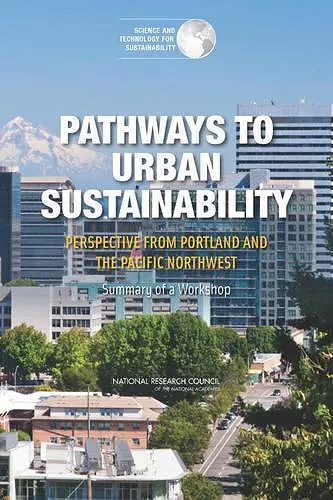Pathways to Urban Sustainability
Perspective from Portland and the Pacific Northwest: Summary of a Workshop
National Research Council author Policy and Global Affairs author Science and Technology for Sustainability Program author Committee on Regional Approaches to Urban Sustainability: A Focus on Portland author Dominic A Brose editor
Format:Paperback
Publisher:National Academies Press
Published:25th Apr '14
Currently unavailable, and unfortunately no date known when it will be back

Pathways to Urban Sustainability: Perspective from Portland and the Pacific Northwest is the summary of a workshop convened by the National Research Council's Science and Technology for Sustainability Program in May 2013 to examine issues relating to sustainability and human-environment interactions in the Portland metropolitan region. Topics addressed included the role of land-use restrictions on development, transportation innovations, and economic and social challenges. The speakers at the workshop used examples from Portland and the greater Pacific Northwest region to explore critical questions in finding pathways to urban sustainability. This was the third and final of a series of three place-based urban sustainability workshops - the other two workshops focused on Atlanta, Georgia and Houston, Texas. These public workshops gathered local, state, and federal officials, academics, and key stakeholders to examine how challenges due to continued growth in the regions can be addressed within the context of sustainability.
For more than 40 years, the Portland Metropolitan Region has been a national leader in urban policies and investments intended to revitalize the central city and adjacent neighborhoods, preserve the environment, improve equity, and make the city more economically competitive and livable. Portland has been both emulated as path breaking and discounted as overly idiosyncratic. Among the elements contributing to Portland's success have been strong public-private partnerships, a culture of planning, and a willingness to implement diverse ideas generated by federal, state, and local agencies, academics, and the private sector. Regionally, Portland benefits from its location in the middle of the progressive Cascadia Corridor, stretching from Vancouver, British Columbia, to San Francisco, California.
This report uses examples from Portland and the Northwest U.S./S.W. Canada region to explore critical questions about the future of urban sustainability. The report provides background about Portland and Cascadia, emphasizing policy innovations and lessons that are potentially transferable elsewhere; focuses on ways to leverage local success through partnerships with state and federal agencies, companies, and nongovernment organizations; examines academic and corporate scientific and engineering research that could help cities to become more sustainable; and addresses the challenging question of how resource-constrained cities can become agents for achieving broader societal goals not directly linked to their operational mandates, such as climate change mitigation, energy independence, and improvement in human health, particularly in low-income communities.
Table...ISBN: 9780309300810
Dimensions: unknown
Weight: unknown
88 pages